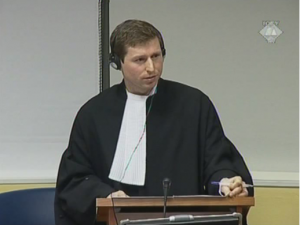Dr Matthew Gillett

Proving the intentional destruction of cultural heritage in armed conflict and situations of forcible displacement
Abstract
Cultural heritage binds communities and societies together and can constitute an essential part of a group’s shared identity. For perpetrators seeking to divide, displace or destroy a people, the targeting of cultural heritage can serve as a proxy for the targeting of the group itself. Because of this, the destruction of cultural heritage features prominently in situations of armed conflict and large-scale displacement. Across the former Yugoslavia, cultural sites, which were often religious buildings, faced concerted targeting throughout the conflicts of the 1990s. In several cases, the International Criminal Tribunal for the former Yugoslavia (ICTY) heard and saw evidence from a variety of sources concerning the destruction of cultural heritage and its links to population displacement. Building on the work and experience of the ICTY, the International Criminal Court has expanded on the means of proving cultural destruction and its links to crimes against civilian populations, particularly in the situation in Mali, where the mausoleums of Timbuktu were intentionally damaged and in some cases destroyed by armed groups alongside the targeting of the residents of that town. Noting the significance of the destruction of cultural heritage as a facet of armed conflict and widespread human rights abuses, this paper examines the means of proving such destruction in international criminal proceedings. It looks to the types of evidence that have been used in past cases, and the manner in which the destruction of cultural heritage has been linked to campaigns of human rights abuses and population displacement as a criminal tactic.
Biography
Dr. Matthew Gillett is an international lawyer and academic who has worked and written on issues concerning international criminal law for over ten years. He currently works as a Trial Lawyer in the Office of the Prosecutor of the International Criminal Court, and has previously worked as a Trial Attorney and Appeals Counsel at the United Nations International Criminal Tribunal for the former Yugoslavia, and as a defence barrister and judges’ clerk in New Zealand. In 2010, he was a member of the New Zealand delegation at the Kampala Review Conference of the International Criminal Court, where the crime of aggression agreed upon. He teaches and writes on issues ranging from crimes against humanity, to terrorism, to criminal procedure, and has received several awards for his academic work.
Read more about Dr Matthew Gillett



